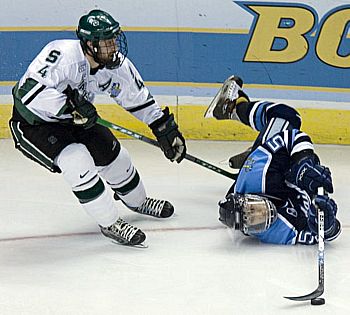If only hockey games were four minutes long.
If they were, the Maine Black Bears would be cruising to the national championship game instead of packing their equipment for a charter flight back to Orono. Maine used early goals — two in the opening 3:24 of play in Thursday’s national semfinal game against Michigan State — to seemingly seize control. Unfortunately, that was all she wrote as Maine would threaten. but never get, another puck past Spartans’ netminder Jeff Lerg.

On an average day, that might not be a problem. With Ben Bishop in goal, two tallies might often be enough to win. The sophomore standout has allowed just 2.08 goals per game on average this season. In the East Regional he allowed just two goals total in the two games.
On Thursday, though, two goals were far from sufficient.
Michigan State exploded for the final four goals of the game, leaving the strong Maine contingent that helped make up the 18,857 in attendance at the Scottrade Center shaking their heads.
They weren’t the only ones. Head coach Tim Whitehead struggled to sum up the game. Was there a turning point? Did things suddenly change?
“It can happen that if you get a lead early, you’re on the defensive for the rest of the game,” said Whitehead, whose team didn’t exactly go into a defensive shell after grabbing the early lead but simultaneously didn’t show the same zest and pop of the opening minutes as the game went on.
“They were really patient,” said captain Michel Léveillé in regards to Michigan State. “They stuck to their game plan. It’s a 60-minute game. A couple of bounces here and there gave them the boost.”
One of those bounces cut into the Maine lead at 7:25 of the first when Chris Mueller batted the rebound of his own shot out of midair, shifting momentum. A Michigan State penalty kill midway through the first, stopping the nation’s best power play, suddenly made the uphill task of getting back into the game seem much less insurmountable for the Spartans.
“You didn’t realize it at the time, but power plays were few and far between in the game,” said Whitehead, whose club wouldn’t get another chance with the man advantge until early in the third period. “The power play has been a big part of our success. So not capitalizing on it [in the first period] really was a turning point.”
A perfectly-placed shot by Michigan State’s Chris Snavely with 3:28 remaining in the second turned the game into a 20-minute battle for survival. That battle, though, was dominated by the Spartans. Nick Sucharski gave State their first lead at 5:11 lifting a puck that Bishop, even at 6-foot-7, couldn’t reach in a wild scrum out front. And yet another puck picked out of the air and pushed past Bishop at 9:46, proved to be plenty of insurance.
“It’s tough when they knock two pucks out of the air [for goals],” said Bishop. “I thought I was playing against a baseball team out there.”
For Maine, there would be posts, crossbars and plenty of loose pucks for the rest of the game. Unfortunately for the Black Bears, though, there would be no goals.
The 4-2 loss ended the Black Bears’ hopes for a third national title in the national semifinal for the second straight season. There will be questions to be answered for Maine in the offseason that could affect whether the club will be back in this same position for a third straight year — most notably whether Bishop will return for his junior season.
The losses that are known, though, are significant. Five seniors, including three of the club’s top five scorers (Léveillé, Josh Soares and Keith Johnson) will graduate, leaving major holes to fill.
For now, though, it’s tough to think about the future when all you can think of is what could’ve been.


